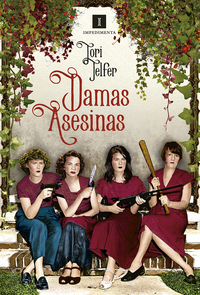You need to sign in or sign up before continuing.
Take a photo of a barcode or cover
challenging
dark
slow-paced
dark
informative
reflective
fast-paced
dark
informative
fast-paced
adventurous
challenging
dark
emotional
informative
sad
tense
medium-paced
"How dangerous it is to be a powerful woman, depending on which academic paper you're reading. We don't quite have everything we need to charge her with her crimes. There are rumors of an incriminating diary lost somewhere in Hungary, and there are scholars who want to clear her name. With so many vanished centuries between her life and ours, we may never get definitive forensic proof of her guilt. And yet she certainly seems to find herself around a lot of blood." Never skip an Erzsebet Bathory chapter!
And an entire chapter dedicated to the "Angel Makers of Nagyrev"? WHO KNEW.
And an entire chapter dedicated to the "Angel Makers of Nagyrev"? WHO KNEW.
While this collection of historical tidbits about female serial killers was illuminating, it was hampered by a lack of competent historical analysis and analysis in general. There's a lot of "pop analysis" sprinkled in, along with some half-hearted attempts at science and a concluding chapter that's less a summation of the stories, or trends in the stories, but authorial indulgence and hand-wringing. Do not want.
The stories of the women themselves are interesting enough in their own right that they deserved better dressing up.
The stories of the women themselves are interesting enough in their own right that they deserved better dressing up.
I love that this book exists. The realm of serial killers is so one-sided, what with all the crazy white guys running around, finding victims to rape, torture, kill, maybe eat, maybe skin.
But here's what I've learned about female serial killers from this book: they do not grab the imagination. They're not terrifying.
In the last chapter, the author addresses this very point right after she mentions telling someone that she empathizes but doesn't sympathize with all the ladies in this volume.
And that's just it.
I totally get why these women ran around killing people, mostly with poison, usually husbands/lovers and other family members. I know what they did was awful but I understand why they did it.

The murderers examined here are predominantly white (there's not much information about women serial killers, in the first place, and hardly anything on women serial killers of color, as evidenced by the brief, unfleshed chapter on Oum-El-Hassen) and mostly passive in their murdering (arsenic did all the work for them). The ones who were ridiculously rich and harder to apply laws to were the more violent ones; they're the ones who killed for entertainment rather than for some sort of gain. They were the more hands-on, violent killers but their motives weren't mysterious, just horrifying in their lack of humanity. The violent women who weren't rich were simply murdering with practicality - get it done quickly, rifle through the pockets, dispose of the body.

Male serial killers (also predominantly white) get all the attention because they are more intriguing, because they're so far removed from anything comprehensible. I read about them and have this deep need to know why they killed people, why they stalked their prey, why they kept little mementos, why they let some members of families live but not others, WHY? There's such a disconnect between my understanding of the world and theirs' and it gives me that creepy frisson in realizing there really are monsters among us and that I am in constant danger.
But these women? I know the why, I feel their motivation. It's all logical and sensical and while I like to believe I live on the right side of doing the right things for the right reasons, I can't honestly say I wouldn't snap one day and start poisoning the people who piss me off. I mean, I haven't stabbed Gabe yet so everyone is probably safe from my machinations; I'm just saying I understand how these women did what they did, regardless of how horrible their actions were. No creepy frissons from them.
Also, several of these women were on murder teams, they weren't solo killers; it’s so much easier to do bad stuff if you’re being goaded and supported by others doing bad stuff. One chapter is about an entire town of poisoners, all the women passing their knowledge along, helping to take out abusive men and needy children, a whole sisterhood of the fly paper poison. As a result, some of these female serial killers shared page space with others, many of whom weren't women. So, really, this is about lady killers and their killing buddies. #squadgoals
This is definitely well-written, well-researched, and interesting. I had not heard of the brigandly Bender family of Cherryvale, Kansas, and that was the closest I came to getting that “Holy crap, that’s awful! What is WRONG with these people?” thrill. But I still wasn’t worried for the safety of my fellow human, I was just shocked that there was a family of murderers hanging out, murdering, in the 1870’s.
Oh, I and also learned that it is really really unsafe to be a sex worker; everyone is out to get you, not just the crazy dudes.
As an addition to a true-crime library, this book is wonderful. As a look into a specific type of serial killer, it doesn’t have a lot of impact. I'm glad I listened to this but I'm not going to recommend it to people who aren't already interested in murder and feminism.
But here's what I've learned about female serial killers from this book: they do not grab the imagination. They're not terrifying.
In the last chapter, the author addresses this very point right after she mentions telling someone that she empathizes but doesn't sympathize with all the ladies in this volume.
And that's just it.
I totally get why these women ran around killing people, mostly with poison, usually husbands/lovers and other family members. I know what they did was awful but I understand why they did it.

The murderers examined here are predominantly white (there's not much information about women serial killers, in the first place, and hardly anything on women serial killers of color, as evidenced by the brief, unfleshed chapter on Oum-El-Hassen) and mostly passive in their murdering (arsenic did all the work for them). The ones who were ridiculously rich and harder to apply laws to were the more violent ones; they're the ones who killed for entertainment rather than for some sort of gain. They were the more hands-on, violent killers but their motives weren't mysterious, just horrifying in their lack of humanity. The violent women who weren't rich were simply murdering with practicality - get it done quickly, rifle through the pockets, dispose of the body.

Male serial killers (also predominantly white) get all the attention because they are more intriguing, because they're so far removed from anything comprehensible. I read about them and have this deep need to know why they killed people, why they stalked their prey, why they kept little mementos, why they let some members of families live but not others, WHY? There's such a disconnect between my understanding of the world and theirs' and it gives me that creepy frisson in realizing there really are monsters among us and that I am in constant danger.
But these women? I know the why, I feel their motivation. It's all logical and sensical and while I like to believe I live on the right side of doing the right things for the right reasons, I can't honestly say I wouldn't snap one day and start poisoning the people who piss me off. I mean, I haven't stabbed Gabe yet so everyone is probably safe from my machinations; I'm just saying I understand how these women did what they did, regardless of how horrible their actions were. No creepy frissons from them.
Also, several of these women were on murder teams, they weren't solo killers; it’s so much easier to do bad stuff if you’re being goaded and supported by others doing bad stuff. One chapter is about an entire town of poisoners, all the women passing their knowledge along, helping to take out abusive men and needy children, a whole sisterhood of the fly paper poison. As a result, some of these female serial killers shared page space with others, many of whom weren't women. So, really, this is about lady killers and their killing buddies. #squadgoals
This is definitely well-written, well-researched, and interesting. I had not heard of the brigandly Bender family of Cherryvale, Kansas, and that was the closest I came to getting that “Holy crap, that’s awful! What is WRONG with these people?” thrill. But I still wasn’t worried for the safety of my fellow human, I was just shocked that there was a family of murderers hanging out, murdering, in the 1870’s.
Oh, I and also learned that it is really really unsafe to be a sex worker; everyone is out to get you, not just the crazy dudes.
As an addition to a true-crime library, this book is wonderful. As a look into a specific type of serial killer, it doesn’t have a lot of impact. I'm glad I listened to this but I'm not going to recommend it to people who aren't already interested in murder and feminism.
I know the names of a few female serial killers: Kate Bender, Nanny Doss, Belle Gunness, Mary Ann Cotton, Aileen Wuornos (probably spelt that wrong?), Sheila La Barre, Beverly Allitt (local to me), Amelia Dyer... There's a few of them, and some of the women in this book I hadn't heard off, especially the women from Egypt and Algeria, Eastern Europe and Russia. Clearly, my knowledge of serial killers is far too focused on Britain and the U.S. (I listen to a lot of true crime podcasts - I recommend 'Small Town Murder'),
Tori Telfer writes clearly and entertainingly, and covers a variety of women, some of whom true crime fans may not have heard about. I sat and read this book in five hours. The writing doesn't sensationalise or glamorise their crimes; Telfer attempts to give us some insight into their behaviour and the cultural, social or psychological reasons for the crimes.
Also, I really recommend Tori's podcast 'Criminal Broads'. First dozen episodes have painful, weird, high-pitched music but it improves in later episodes.
Tori Telfer writes clearly and entertainingly, and covers a variety of women, some of whom true crime fans may not have heard about. I sat and read this book in five hours. The writing doesn't sensationalise or glamorise their crimes; Telfer attempts to give us some insight into their behaviour and the cultural, social or psychological reasons for the crimes.
Also, I really recommend Tori's podcast 'Criminal Broads'. First dozen episodes have painful, weird, high-pitched music but it improves in later episodes.
"Should anything human be alien to us? That question is terrifying, and beautiful."
dark
informative
mysterious
medium-paced
I was very put off and considered not finishing this when the author mentioned men's rights activist blogs in the intro (I mean, seriously?)
That said, the profiles were well presented and written. I had previously heard of at least two of the women included, but still learned more about them. If you have an interest in the topic, this is worth reading. I didn't absolutely love it, but it was interesting.
That said, the profiles were well presented and written. I had previously heard of at least two of the women included, but still learned more about them. If you have an interest in the topic, this is worth reading. I didn't absolutely love it, but it was interesting.






